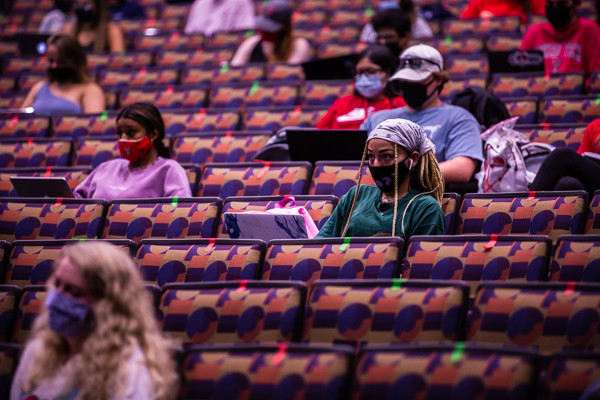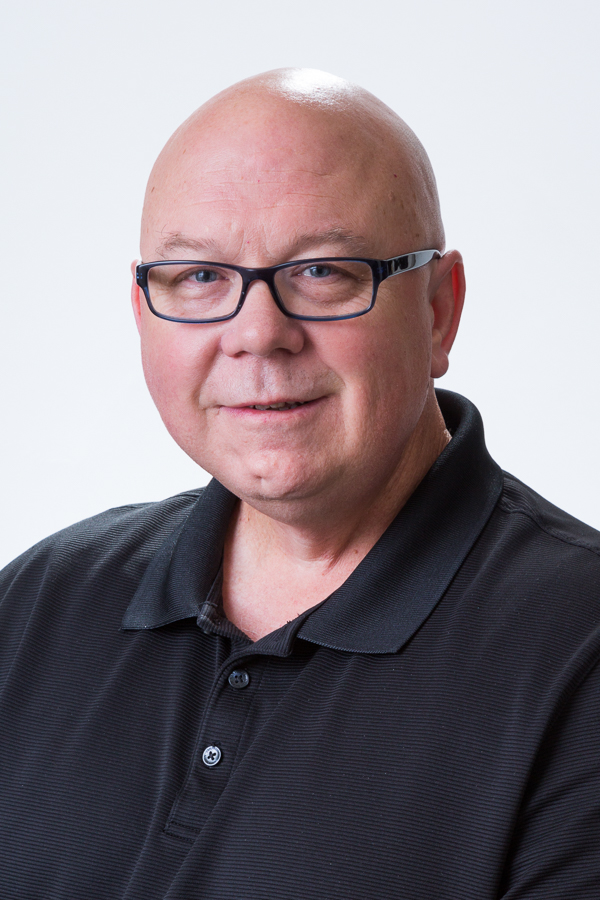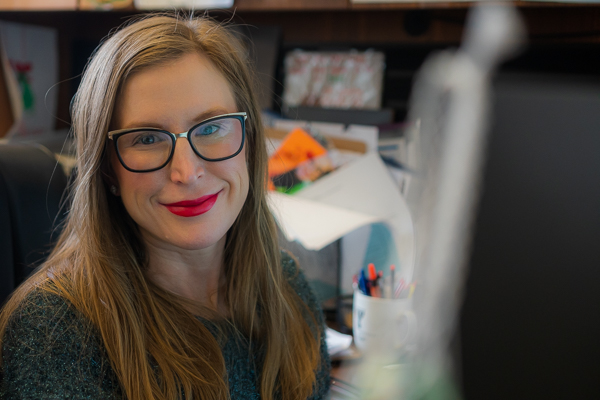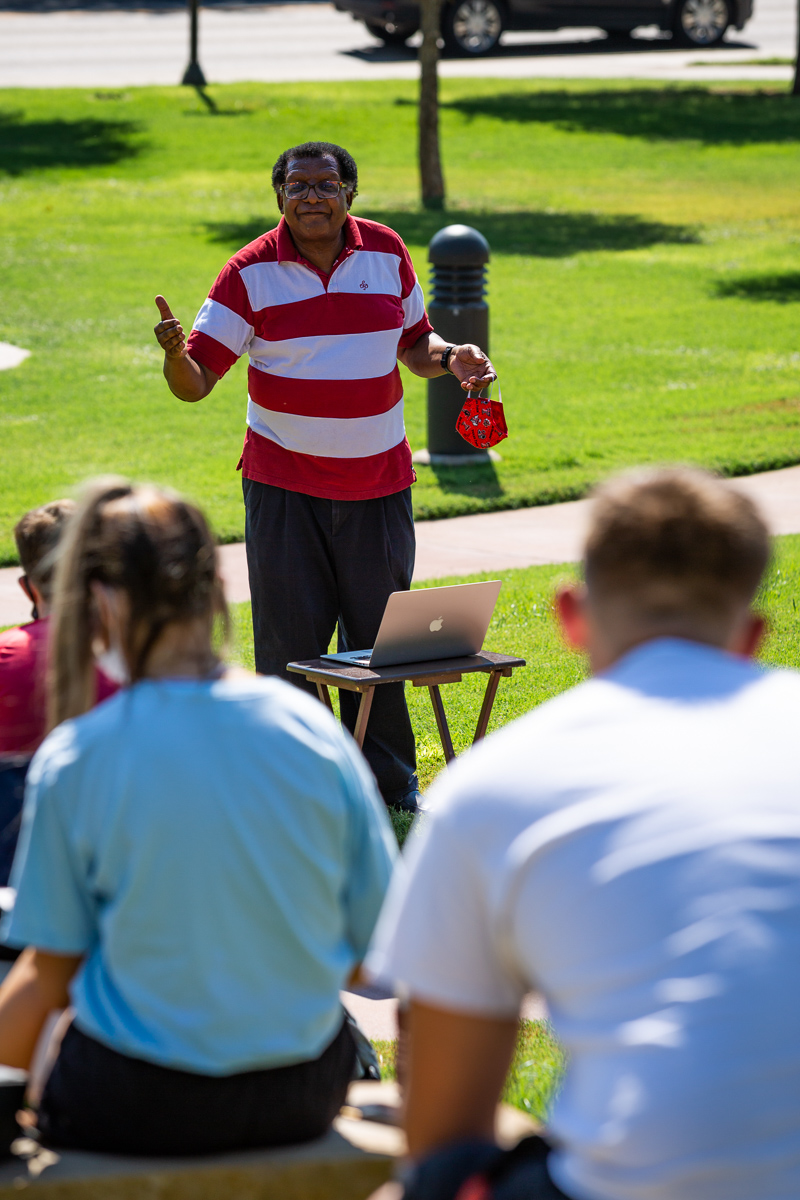Although last semester bore both challenges and opportunities under the university-wide transition to a mix of face-to-face, hybrid and online course modalities, the College of Media & Communication celebrated a sustained high retention rate moving into the spring 2021 academic session.

According to Todd Chambers, Ph.D, associate dean for undergraduate affairs, the effort to keep CoMC's high student retention rate is in great part due to preserving the college's transformative educational experience and the determination of the students themselves.
“One of the things I see in our students is tenacity,” Chambers says. “It's a testament to our students because they have grit. They're determined to be problem solvers and solve those challenges.”
 Chambers can't help but smile thinking about the college's student organizations'
abilities to tackle the pandemic's physical limitations.
Chambers can't help but smile thinking about the college's student organizations'
abilities to tackle the pandemic's physical limitations.
“I've seen students tell themselves, ‘Oh, we can't do this…so let's do this instead!'” Chambers says, referencing group meeting restrictions for student organizations. “That's one of the things I'm glad to see because our students can still pick up the ball and keep running, even if they can't offer free One Guy's as an incentive for meeting attendance.”
Julia Heard Witt, director of advising and recruiting, adds that incoming first year students were just as eager as before the start of the global pandemic for the fall semester.
“During orientation, we had parents and students asking if they were going to receive the same experience or if it would be hindered in any way because of the pandemic,” Heard Witt says. “I was surprised that we got those questions more frequently than safety questions. These students were ready to get here and learn.”
According to Heard Witt, students found an opportunity to contribute to the new online and hybrid learning environments. She notes that students were likely to engage with a class more than ever because of their educational pursuit and new learning contexts.
Heard Witt also describes the CoMC advising team's drive matched the students' energy.

“As a college, we offered more one-on-one help for the students knowing it was easier to establish a Zoom connection than have them schedule an in-person visit,” Heard Witt says. “Zoom allows for more interaction, but it also allows us to share screens with students. We can help them with missing documents or see if they've completed certain processes.”
Heard Witt considers this type of involvement crucial to building an interpersonal relationship with students who might have difficulty coming into Tech. Dr. Chambers concurs.
“Our students had more one-on-one opportunities than they ever would have got or taken face-to-face,” Chambers says. “Moving forward, we knew it was going to be an important piece the more we brought people into our college. The virtual setting just allows you to take a little more time for each student.”
Like Heard Witt, Chambers notes that the undergraduate advising team's commitment to students is unparalleled.
“We brag about our advising team, that you're going to see your advising team and give them a high five at graduation,” Chambers adds. “The advising team will do exactly that! That's the kind of team Julia has built. Our students know they'll find knowledgeable and quality information from our advisers.”
Chambers also celebrates Heard Witt's contribution to CoMC's recruiting efforts.
“Julia brought new and fresh ideas to our college recruiting that focused on her specialty, which is retention,” Chambers says. “She knows all the challenges that come with a student's life, including financial and cultural difficulties and she has transformed our advising office into a place where students can learn about life.”
Heard Witt redirects the credit to her own advising team.
“All the academic advisers made this possible,” Heard Witt says “Every one of them is invaluable to student engagement and recruiting. It can't just be one person. It's a team effort, and I couldn't do it without the help from my advisers.”
Heard Witt knew her team needed to adapt to maintain the college's transformative educational experience during the transition to several different course and communication modalities.
 “We can't be doing the same things we were doing pre-pandemic and expect them to work,”
Heard Witt says. “In my advising unit, we always assess ourselves and ask what works.
What can we do different and what can we do better?”
“We can't be doing the same things we were doing pre-pandemic and expect them to work,”
Heard Witt says. “In my advising unit, we always assess ourselves and ask what works.
What can we do different and what can we do better?”
Dr. Chambers shares the same perspective when comparing the CoMC experience from two years ago and adapting it to a new educational format.
“I love the word adapt because it's a thing we've all had to do,” Chambers says. “We know this isn't the same college experience you'd find two years ago. We knew we had to transform our advising into a place where students could continue that same experience.”
Chambers hopes that the same approach to providing a high-quality college experience persists well after the pandemic.
“If you asked anyone in our advising department what makes our college great, I hope they'll say the interpersonal relationships,” Chambers says. “I honestly believe that's who we are. It's because we have a passionate advising unit that cares that we are able to keep the CoMC transformative experience alive.”
